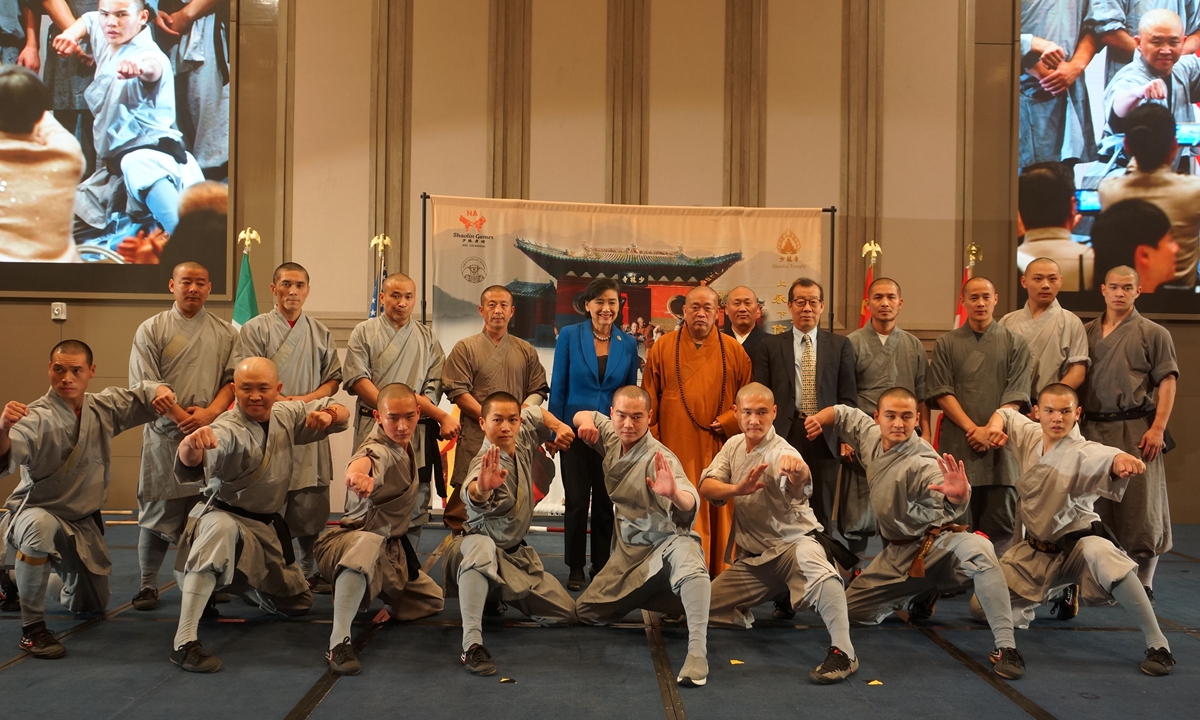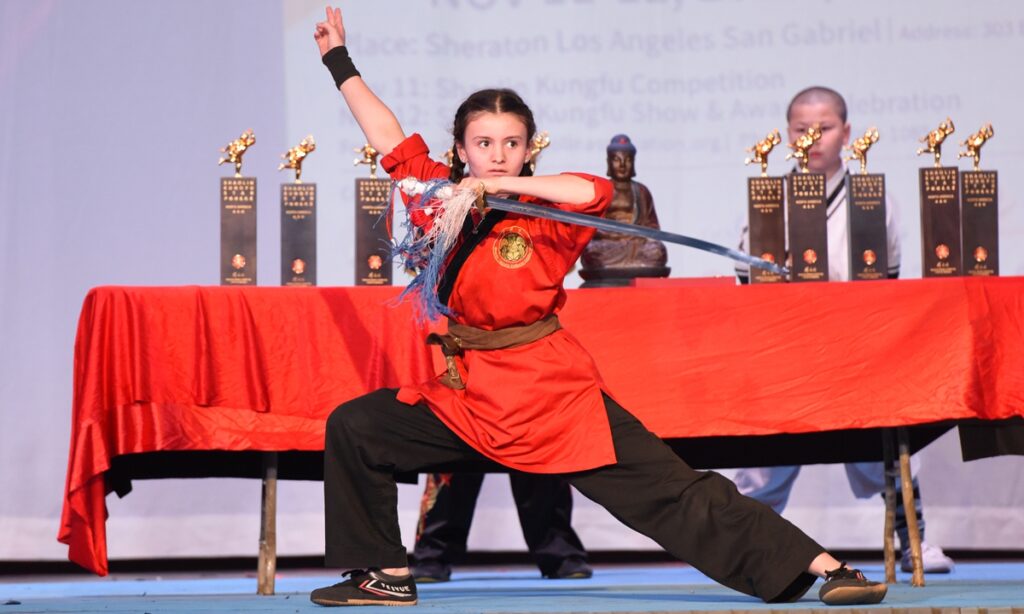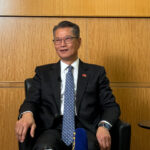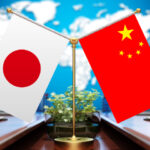A taste of Chinese kung fu
Drunken fist, spear techniques, staff techniques… these are the Shaolin kung fu skills traditionally showcased in Hollywood movies. These and other kung fu techniques were demonstrated at the 2023 North American Shaolin Games held in Los Angeles.
Approximately 500 Shaolin disciples from over 40 states in the US, as well as from countries and regions including Canada and Mexico, participated in the event.
A decade since the first North American Shaolin Cultural Festival in 2013, the Shaolin Temple, renowned for its centuries-old tradition of martial arts, is once again hosting an official cultural exchange event in the US, featuring performances and competitions for all ages from 4 to 60.
“Shaolin culture, as a representative of excellent traditional Chinese culture, conveys values of compassion, peace, health, and harmony that everyone can accept and feel. I believe Shaolin culture can establish positive connections with people from countries all over the world,” Shi Yongxin, Abbot of the Shaolin Temple, told the Global Times.
In his opening speech at the games, Shi expressed the hope that through this event, the values of Shaolin kung fu – physical fitness, clarity of mind, and harmony – could be showcased.
“We hope that overseas Shaolin kung fu practitioners will actively inherit and disseminate Chinese culture, promoting the understanding and appreciation of Chinese culture among people of various ethnicities and contributing to the deepening of the friendship between the Chinese and American peoples,” remarked Wang Taiyu, Cultural Counselor of the Chinese Consulate General in Los Angeles, at the opening ceremony of the games.
The examination of practice is a tradition at the Shaolin Temple. Every year, the temple assesses eight kinds of practice, including preaching, chanting, and the etiquette of the disciples over the past year. The Shaolin kung fu examination, known as “kaogong” in Chinese, is one of these eight components.
Flourishing overseas
The tradition of Shaolin kung fu competitions has flourished overseas since 2011, according to Shi. Events like the European Shaolin Cultural Festival and the North American Shaolin Cultural Festival all regard the Shaolin kung fu competition as core. In 2022, the Shaolin kung fu online competition continued this tradition, uniting 5,320 participants from 94 countries and regions across six continents.
The North American Shaolin Games is one of the events jointly organized by the Shaolin Temple and the Six Continents Shaolin Federation for the 2023-2024 World Six Continents Shaolin Kung Fu Examination Competition.
The games aim to “promote the organization of the competition, increase the autonomy and enthusiasm of all continents and countries and regions, facilitate multilevel participation and exchanges, and realize the normalization and sustainability of Shaolin kung fu competitions, while enhancing standardization, internationalization, socialization, and Shaolin kung fu brand reputation,” according to Shi.
Prior to the North American examination, past editions of the Shaolin Games were held in Zambia in Africa, Singapore in Asia, and Argentina in Latin America.

Shi Yongxin (back row, center), Abbot of the Shaolin Temple, poses for a photo with guests and participants of the 2023 North American Shaolin Games in Los Angeles, the US, on November 10, 2023. Photo: Courtesy of the Shaolin Temple
In the current North American examination, over 500 Shaolin disciples participated in nearly 2,000 matches. “Shaolin kung fu and tai chi style are something the West can learn from the East,” Grandmaster Sin Kwan Thé, leader of a number of Shaolin centers across the US, told the Xinhua News Agency.
He added that one of the best effects of Shaolin kung fu is physical fitness, and regular practice can increase cardiovascular fitness, improve muscle tone, enhance flexibility, and even better one’s posture.
According to Shi, currently, the Shaolin Temple has over 300 overseas Shaolin cultural centers in more than 100 countries and regions.
In the US alone, more than 40 states boast Shaolin cultural centers, some operated by monks sent from the temple and others established by overseas disciples, Shi told the Global Times.
Shaolin kung fu is a representative of Shaolin culture. Shaolin culture encompasses various forms of expression, including health preservation, martial arts, medicine, and Zen art, Shi said, adding, “The rich tapestry of Shaolin culture allows individuals from different walks of life to experience its unique charm,” in response to why Shaolin culture is popular in Western countries.
The North American Shaolin Games is one of the many events Abbot Shi has taken part in during his 13-day North American tour which kicked off on November 1.
Shi’s visits have included participation in various celebrations hosted by Shaolin Temple USA, such as the 15th and 16th anniversary celebrations of the San Francisco Shaolin Cultural Center and the Fremont Shaolin Cultural Center, respectively.
At Fremont, Shi hosted prayer ceremonies, introduced his new English book The Shaolin Temple Story, held book signings, and visited the Chinatown of San Francisco. Additionally, Shi provided guidance during visits to several Shaolin academies in the San Francisco Bay Area.
‘A standardized system’
Looking ahead, Abbot Shi shared the Shaolin Temple’s plans to promote systematic and scientific learning of Shaolin kung fu by introducing the “Shaolin Duanpin system,” a rating system for the evaluation of Shaolin kung fu practitioners.
The promotion of the system “aims to establish a standardized system of Shaolin kung fu routines, promoting the dissemination of Shaolin kung fu both domestically and internationally. This is to achieve the goals of promoting traditional Chinese culture and enhancing the health of people worldwide,” Shi told the Global Times.
This year, the Shaolin Temple staged the first Shaolin Duanpin workshops. “The promotion and development of the standardized “Shaolin Duanpin system” will propel Shaolin kung fu into a new historical development stage,” Shi said.
(Global Times)




